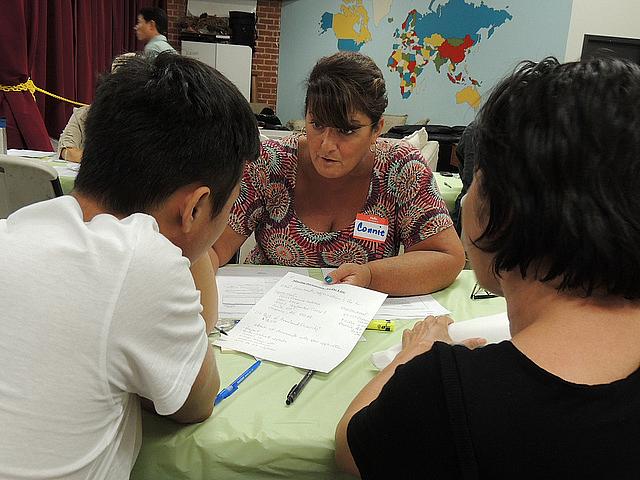Undocumented young adults left in limbo in wake of Obamacare

A family receives information at a workshop on Deferred Action.
In 2012, the lives of nearly 1.5 million immigrants who arrived to the United States as children were positively affected with President Obama’s executive action. Undocumented youth who were over 15 years of age and under 31 and met certain qualifications were deferred from deportations and allowed to apply for a renewable two-year work permit, a social security number and, in the majority of states, a driver’s license.
Three years later, more than 836,000 young immigrants have applied to the program known as Deferred Action for Childhood Arrivals (DACA). A significant number of them have been able to continue their higher education, apply for college and receive a certain type of financial aid. Those who graduated or are about to graduate from college are obtaining better paid jobs.
I have met several DACA eligible immigrants including lawyers, doctors, teachers, accountants, engineers, journalists and many more working in different fields. And many others are attending some of the most prestigious universities of the country.
Despite the good news, however, there are still some obstacles for these immigrants. DACA recipients — also known as Dreamers — cannot apply for health coverage through the Affordable Care Act, since technically they are neither legal residents of the U.S. nor citizens.
The Obamacare Facts website states that individuals who qualify DACA, signed by President Obama on June, 15, 2012, “can’t use the marketplace” to purchase health insurance, but aren’t required to pay the penalty fee that legal residents and citizens would have to pay if they don’t have coverage.
In certain states, including California, DACA recipients can apply for Medicaid or emergency Medi-Cal as long as they prove they are low-income and/or under the age of 21.
Skilled professionals have begun to see their lives and wallets affected. They don’t earn minimum wage any longer and many of them are over 21 years old, so they are not dependents of their parents anymore. They are allowed to purchase private insurance, yet the options available are very limited, and with sky-high prices that can make it nearly impossible to afford. Private health insurance for an individual can cost up to $500 a month, plus co-pays.
That’s enough to leave many Dreamers without health insurance.
I will investigate in more depth how this situation has forced them to deal with health issues. Where do they go when they get sick? What’s the percentage of DACA recipients purchasing health insurance and how did they get it?
In 2014, Los Angeles County approved the My Health LA program, which allows low-income Angelenos, whether they are legal or undocumented, obtain free primary care and health screenings in 164 county health clinics, as well as to obtain prescription medications and referrals to specialty care at county facilities.
DACA recipients do not qualify for this program either, because they are not considered undocumented since they possess a social security number and a work permit.
The National Immigration Law Center states on its webpage that DACA recipients are excluded from almost all affordable health insurance options. “They will be treated as though they are undocumented, even though they are otherwise considered lawfully present and are eligible for a work permit and a Social Security number.”
Some DACA recipients have been able to obtain health insurance through their employer, which is of great help. Those who qualify under the low-income eligibility threshold are also covered.
For my 2016 California Fellowship project, I propose to investigate what options are available in Los Angeles County, including: emergency-room care; community health centers and free clinics; public health services (immunizations, treatment of communicable diseases such as tuberculosis, HIV, sexually transmitted diseases); employer provided health insurance, etc.
I have found there are some options for Dreamers who want to apply for health coverage under the Covered California program. I will investigate in depth and explain what the process entails, as well as what Dreamers can do when they are charged the penalty fee for not having health insurance.
[Photo by Korean Resource Center via Flickr.]

